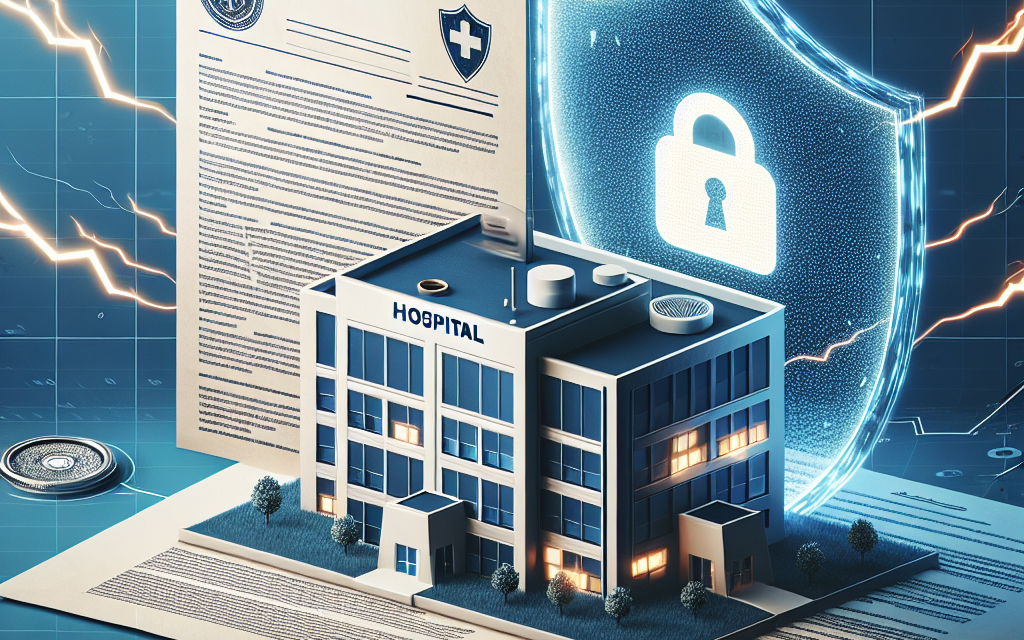New House Bill Seeks to Safeguard Against Hospital Cyberattacks
In an era where technology is deeply integrated into healthcare, the threat of cyberattacks on hospitals has become a pressing concern. The recent introduction of a new House bill aims to address these vulnerabilities and enhance the cybersecurity framework within healthcare institutions. This article delves into the implications of this legislation, the current state of hospital cybersecurity, and the measures being proposed to safeguard sensitive patient data and critical healthcare infrastructure.
The Growing Threat of Cyberattacks in Healthcare
The healthcare sector has increasingly become a prime target for cybercriminals. According to a report by the Cybersecurity & Infrastructure Security Agency (CISA), healthcare organizations experienced a staggering 50% increase in cyberattacks in 2021 compared to the previous year. This surge can be attributed to several factors:
- Valuable Data: Hospitals store vast amounts of sensitive patient information, including personal identification, medical histories, and financial data, making them lucrative targets for hackers.
- Inadequate Security Measures: Many healthcare facilities, especially smaller ones, often lack robust cybersecurity protocols due to budget constraints and a focus on patient care over IT security.
- Ransomware Attacks: Ransomware has emerged as a significant threat, with attackers encrypting hospital data and demanding payment for its release. The 2020 attack on Universal Health Services, which affected over 400 facilities, is a prime example.
These factors highlight the urgent need for legislative action to bolster cybersecurity in healthcare settings. The new House bill aims to address these vulnerabilities by establishing comprehensive guidelines and support systems for hospitals.
Overview of the New House Bill
The proposed House bill, titled the “Healthcare Cybersecurity Protection Act,” seeks to implement a multi-faceted approach to enhance cybersecurity in hospitals. Key provisions of the bill include:
- Mandatory Cybersecurity Assessments: Hospitals will be required to conduct regular cybersecurity assessments to identify vulnerabilities and implement necessary improvements.
- Funding for Cybersecurity Initiatives: The bill allocates federal funding to support hospitals in upgrading their cybersecurity infrastructure and training staff on best practices.
- Collaboration with Federal Agencies: The legislation encourages collaboration between healthcare organizations and federal cybersecurity agencies to share threat intelligence and best practices.
- Incident Response Plans: Hospitals will be mandated to develop and maintain incident response plans to ensure swift action in the event of a cyberattack.
- Public Reporting Requirements: The bill includes provisions for public reporting of cyber incidents, promoting transparency and accountability within the healthcare sector.
This comprehensive approach aims to create a more resilient healthcare system capable of withstanding and responding to cyber threats effectively.
Impact on Healthcare Organizations
The implementation of the Healthcare Cybersecurity Protection Act is expected to have significant implications for healthcare organizations across the country. Here are some potential impacts:
- Increased Investment in Cybersecurity: With federal funding available, hospitals will likely increase their investment in cybersecurity technologies and training programs, leading to improved defenses against cyber threats.
- Enhanced Collaboration: The bill encourages collaboration between healthcare organizations and federal agencies, fostering a culture of shared knowledge and resources that can enhance overall cybersecurity posture.
- Improved Patient Trust: By demonstrating a commitment to cybersecurity, hospitals can enhance patient trust, knowing that their sensitive information is being protected.
- Operational Changes: Hospitals may need to implement new operational protocols to comply with the bill’s requirements, which could involve hiring additional IT staff or investing in new technologies.
- Potential Challenges: While the bill aims to improve cybersecurity, some hospitals may face challenges in meeting the new requirements, particularly smaller facilities with limited resources.
Overall, the bill is poised to create a more secure environment for patient data and healthcare operations, but it will require a concerted effort from all stakeholders involved.
Case Studies: Lessons from Recent Cyberattacks
To understand the urgency of the new legislation, it is essential to examine recent high-profile cyberattacks on healthcare organizations. These case studies provide valuable insights into the vulnerabilities that exist and the potential consequences of inadequate cybersecurity measures.
The Universal Health Services Attack
In September 2020, Universal Health Services (UHS), one of the largest healthcare providers in the United States, fell victim to a ransomware attack that crippled its operations across more than 400 facilities. The attack forced UHS to revert to paper-based systems, delaying patient care and causing significant disruptions. The incident highlighted several critical lessons:
- Importance of Incident Response Plans: UHS’s lack of a robust incident response plan contributed to the chaos following the attack. The need for hospitals to have well-defined protocols in place is paramount.
- Need for Regular Assessments: The attack underscored the importance of conducting regular cybersecurity assessments to identify vulnerabilities before they can be exploited by attackers.
- Collaboration is Key: The incident demonstrated the value of collaboration between healthcare organizations and cybersecurity experts to share threat intelligence and best practices.
The Scripps Health Breach
In May 2021, Scripps Health experienced a significant data breach that compromised the personal information of over 147,000 patients. The breach was attributed to a ransomware attack that disrupted the organization’s IT systems. Key takeaways from this incident include:
- Patient Data Protection: The breach highlighted the critical need for healthcare organizations to prioritize the protection of patient data, as breaches can lead to identity theft and other serious consequences for individuals.
- Investment in Cybersecurity: Scripps Health’s experience emphasizes the importance of investing in cybersecurity measures, including employee training and advanced security technologies.
- Regulatory Compliance: The incident raised questions about compliance with regulations such as HIPAA, which mandates the protection of patient information. Hospitals must ensure they are meeting these requirements to avoid legal repercussions.
These case studies illustrate the real-world consequences of cyberattacks on healthcare organizations and underscore the importance of the proposed legislation in preventing similar incidents in the future.
Challenges and Considerations for Implementation
While the Healthcare Cybersecurity Protection Act presents a promising framework for enhancing cybersecurity in hospitals, several challenges and considerations must be addressed during implementation:
- Resource Constraints: Many healthcare organizations, particularly smaller facilities, may struggle to allocate the necessary resources for compliance with the new requirements. Federal funding will be crucial in alleviating this burden.
- Staff Training: Ensuring that all staff members are adequately trained in cybersecurity best practices is essential. Hospitals must invest in ongoing training programs to keep employees informed about evolving threats.
- Balancing Security and Patient Care: Hospitals must find a balance between implementing stringent cybersecurity measures and maintaining a focus on patient care. Overly restrictive protocols could hinder healthcare delivery.
- Keeping Up with Evolving Threats: Cyber threats are constantly evolving, and hospitals must remain vigilant and adaptable to new attack vectors. Continuous monitoring and assessment will be necessary to stay ahead of potential threats.
- Public Awareness: Raising public awareness about the importance of cybersecurity in healthcare is vital. Patients should be informed about how their data is being protected and the steps hospitals are taking to enhance security.
Addressing these challenges will be critical to the successful implementation of the new legislation and the overall improvement of cybersecurity in healthcare.
Conclusion: A Step Towards a Safer Healthcare Future
The introduction of the Healthcare Cybersecurity Protection Act marks a significant step towards safeguarding hospitals against the growing threat of cyberattacks. By mandating regular assessments, providing federal funding, and promoting collaboration between healthcare organizations and federal agencies, the bill aims to create a more resilient healthcare system.
As cyber threats continue to evolve, it is imperative for healthcare organizations to prioritize cybersecurity and invest in the necessary resources to protect sensitive patient data. The lessons learned from recent cyberattacks serve as a stark reminder of the potential consequences of inadequate security measures.
Ultimately, the successful implementation of this legislation will require a collective effort from all stakeholders involved, including healthcare providers, government agencies, and patients. By working together, we can create a safer healthcare environment that prioritizes the protection of patient information and ensures the continuity of care in the face of cyber threats.





